Open you eyes...
On 8th October 2005, a devastating earthquake rocked the mountainous region of central Asia. The still-disputed region of Kashmir is divided into two areas — Azad Jammu & Kashmir controlled by Pakistan and the Kashmir controlled by India. The epicentre of the earthquake lay near the city of Muzaffarabad on the Pakistani side of the border and reigned havoc for miles across the region. Official sources place the death toll at around 80 000, but word on the ground is that way more than 100 000 people lost their lives in the calamity. Kashmir, being a heavily disputed and hostile region, has a very poor system of infrastructure, which has affected the pace of the relief project. Visiting the affected areas two months after the disaster, I saw a still-fresh scar. Everywhere; unbelievable devastation, the few buildings that withstood the earth-levelling now have major structural damage and the rubble remains as silent ubiquitous reminders. 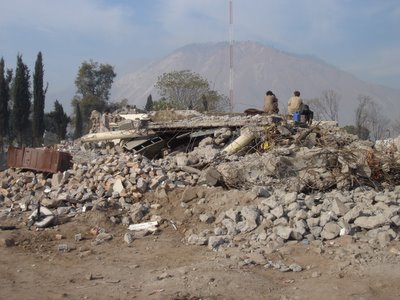
December usually sees heavy snow falls in this mountainous region but luckily the heavy snow falls have not begun. The mountain tops however are all beautifully snow capped and the temperature drops to below zero as soon as the sun sets. The scenic valleys, flowing rivers, majestic mountains and lush forests all easily fool one into thinking that this is “heaven on earth,” but the reality of the situation is very different. The people of the region have found themselves caught between two hostile nuclear powers ever since the 1940’s. They are largely a simple, mountain people who wish only for peace and to be left alone to get on with their lives. But due to the conflict, the area that has views to rival Switzerland and which once ran a lucrative tourism operation has been forced to survive on donor and relief aid. There is no local industry and it seems as if the governments on both sides are reluctant to spend money on infrastructure until the conflict is resolved. Being here, one understands more fully the scale of the problem at hand. The earthquake, devastating in itself, is only the most recent calamity to befall this already beleaguered region. This enormous natural disaster has just further compounded the political and social problems that come with living in one of the most disputed territories on earth.
To feel the earth move is incredible. While I was there, two smaller quakes struck. The first happened late one night while I was sleeping in a hotel in Islamabad. At first, I didn’t know what was happening and just rolled over and went back to sleep. But the second earthquake happened during the day. I was standing outside the tent hospital at the Chitta Batta camp, talking to a volunteer from Spain about his experiences so far. Then I felt something moving. I looked around to see what it was, a table? Something big in the tent? I looked in all directions in search of what was moving. I looked everywhere, except down. My mind couldn’t comprehend that the ground was moving under my feet! Some children in the hospital, still traumatised by the first massive earthquake, had started screaming and running outside. Mountains normally give one a sense of security, but here, with the ground literally moving under our feet, the mountains are terrifying. How easily nature’s force had made them crumble. In Muzzafrabad, the gateway to Jammu Kashmir, and the epicentre of the earthquake, the mountains around the city came crashing to the ground, together with the homes and people that inhabited its slopes. The sight that remains is unbelievable. Look up and what one sees is half a mountain, the rest of it a pile of rocks at its feet.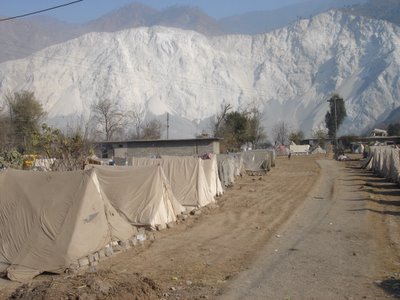
Poles, Swedes, Germans, Indians, Americans, British — almost every country has citizens busy with relief work, as individuals or as part of NGO’s; the whole world has come together to assist those suffering in their time of strife. And adequate co-ordination, surprising considering our close proximity to Pakistan, ensures that duplicity and redundancy is vastly reduced. Tent camps have been set up by these organisations, groups and even some individuals, where people are provided with tents, food and clothing. Some camps are better funded and maintained than others, but on the whole I found that almost everyone was in some way being taken care of.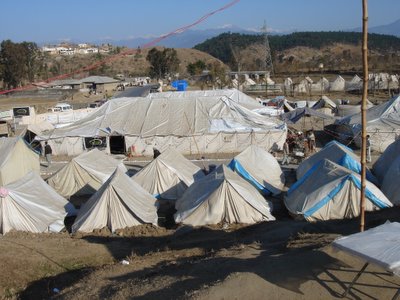
The most difficult thing for me was surviving the cold — below freezing temperatures with little protection from the harsh elements but the clothes on your back and a flimsy tent. Fires or any heating inside the tents are forbidden and rightly so. We witnessed a few tents catch alight after a gas fire broke out in a nearby tent camp. The occupants risked their lives trying to once again save their meagre possessions but luckily there were no serious injuries in that one incident. One really appreciates a roof and indoor heating after spending a few weeks in a tent — but I was there by choice and for a limited period. Soon I would return home to the luxuries and comforts to which I am accustomed, but what about those who have no prospect of a warm bed or hot shower to look forward to in the near future?
We spent most of our time helping out in the tent camps that have been set up to provide temporary shelter until homes can be rebuilt. We did a bit of ‘hard’ labour: put up tents and built fences. We gained some medical experience in the camp hospitals: dressed wounds, checked temperatures and assisted the aged and injured. Clothing and food distributions are done regularly to ensure a constant supply of provisions. Distributions are co-ordinated by the different organisations working in the different areas so that all those deserving receive what they need.
Everyone we met had a story to share. The earthquake spared nobody, rich or poor, educated or illiterate; almost everyone lost either their homes or loved ones or more. University students crushed to death while they sat in lectures, others who were late for campus luckily survived and tell how they came to help try to dig out those who trapped in the rubble. Parents and loved ones who walked miles to try and find family friends in other areas since the roads were destroyed and obstructed by landslides.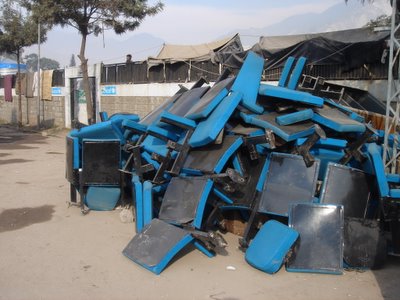
The struggle is now to survive the winter so that in the spring the displaced can go back into the mountains to rebuild their homes and their lives. Warm temporary shelters, are currently being built. Without these, chances of surviving the winter are slim. A 9 year old boy died in front of our eyes a day before I left. His home, like everybody else’s had been destroyed. He was living in a tent and the cold was too severe for his young body. He developed pneumonia and was hastily rushed to the hospital but it was too late. Later that evening we went to collect his body. We washed and shrouded him and prepared him for burial. His family, perhaps because of having experienced so much loss and suffering, were surprisingly composed. For them, this was not the end but just more burden and sadness with which they had to bear. For them, the winter and the suffering were far from over. For them, the future didn’t seem very promising and all they could do was to hope and pray. Pray that they would soon see better days…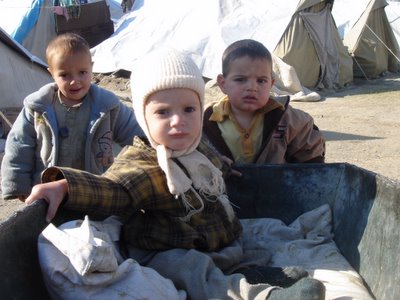
In Kashmir I saw beauty and poverty, I experienced suffering and hope, I felt misery and love; and most of all, the experience taught me to see. It opened my eyes, eyes which were shut for a long time. When I came back home I saw exceptional beauty and catastrophic poverty, intense suffering and inspirational hope, severe misery and passionate love! We need to open our eyes and see what is going on around us. For those who are able and capable, go to Kashmir, go wherever your help is needed and welcome. But don’t wait to go before you start giving of yourself, before you start alleviating the suffering of those who are suffering around you, don’t wait to leave home before you open your eyes…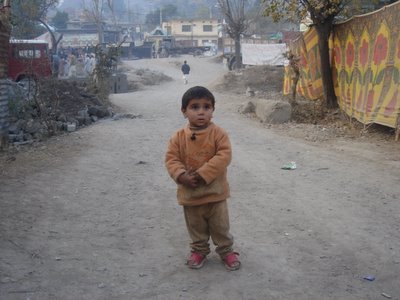

December usually sees heavy snow falls in this mountainous region but luckily the heavy snow falls have not begun. The mountain tops however are all beautifully snow capped and the temperature drops to below zero as soon as the sun sets. The scenic valleys, flowing rivers, majestic mountains and lush forests all easily fool one into thinking that this is “heaven on earth,” but the reality of the situation is very different. The people of the region have found themselves caught between two hostile nuclear powers ever since the 1940’s. They are largely a simple, mountain people who wish only for peace and to be left alone to get on with their lives. But due to the conflict, the area that has views to rival Switzerland and which once ran a lucrative tourism operation has been forced to survive on donor and relief aid. There is no local industry and it seems as if the governments on both sides are reluctant to spend money on infrastructure until the conflict is resolved. Being here, one understands more fully the scale of the problem at hand. The earthquake, devastating in itself, is only the most recent calamity to befall this already beleaguered region. This enormous natural disaster has just further compounded the political and social problems that come with living in one of the most disputed territories on earth.

To feel the earth move is incredible. While I was there, two smaller quakes struck. The first happened late one night while I was sleeping in a hotel in Islamabad. At first, I didn’t know what was happening and just rolled over and went back to sleep. But the second earthquake happened during the day. I was standing outside the tent hospital at the Chitta Batta camp, talking to a volunteer from Spain about his experiences so far. Then I felt something moving. I looked around to see what it was, a table? Something big in the tent? I looked in all directions in search of what was moving. I looked everywhere, except down. My mind couldn’t comprehend that the ground was moving under my feet! Some children in the hospital, still traumatised by the first massive earthquake, had started screaming and running outside. Mountains normally give one a sense of security, but here, with the ground literally moving under our feet, the mountains are terrifying. How easily nature’s force had made them crumble. In Muzzafrabad, the gateway to Jammu Kashmir, and the epicentre of the earthquake, the mountains around the city came crashing to the ground, together with the homes and people that inhabited its slopes. The sight that remains is unbelievable. Look up and what one sees is half a mountain, the rest of it a pile of rocks at its feet.

Poles, Swedes, Germans, Indians, Americans, British — almost every country has citizens busy with relief work, as individuals or as part of NGO’s; the whole world has come together to assist those suffering in their time of strife. And adequate co-ordination, surprising considering our close proximity to Pakistan, ensures that duplicity and redundancy is vastly reduced. Tent camps have been set up by these organisations, groups and even some individuals, where people are provided with tents, food and clothing. Some camps are better funded and maintained than others, but on the whole I found that almost everyone was in some way being taken care of.

The most difficult thing for me was surviving the cold — below freezing temperatures with little protection from the harsh elements but the clothes on your back and a flimsy tent. Fires or any heating inside the tents are forbidden and rightly so. We witnessed a few tents catch alight after a gas fire broke out in a nearby tent camp. The occupants risked their lives trying to once again save their meagre possessions but luckily there were no serious injuries in that one incident. One really appreciates a roof and indoor heating after spending a few weeks in a tent — but I was there by choice and for a limited period. Soon I would return home to the luxuries and comforts to which I am accustomed, but what about those who have no prospect of a warm bed or hot shower to look forward to in the near future?

We spent most of our time helping out in the tent camps that have been set up to provide temporary shelter until homes can be rebuilt. We did a bit of ‘hard’ labour: put up tents and built fences. We gained some medical experience in the camp hospitals: dressed wounds, checked temperatures and assisted the aged and injured. Clothing and food distributions are done regularly to ensure a constant supply of provisions. Distributions are co-ordinated by the different organisations working in the different areas so that all those deserving receive what they need.

Everyone we met had a story to share. The earthquake spared nobody, rich or poor, educated or illiterate; almost everyone lost either their homes or loved ones or more. University students crushed to death while they sat in lectures, others who were late for campus luckily survived and tell how they came to help try to dig out those who trapped in the rubble. Parents and loved ones who walked miles to try and find family friends in other areas since the roads were destroyed and obstructed by landslides.

The struggle is now to survive the winter so that in the spring the displaced can go back into the mountains to rebuild their homes and their lives. Warm temporary shelters, are currently being built. Without these, chances of surviving the winter are slim. A 9 year old boy died in front of our eyes a day before I left. His home, like everybody else’s had been destroyed. He was living in a tent and the cold was too severe for his young body. He developed pneumonia and was hastily rushed to the hospital but it was too late. Later that evening we went to collect his body. We washed and shrouded him and prepared him for burial. His family, perhaps because of having experienced so much loss and suffering, were surprisingly composed. For them, this was not the end but just more burden and sadness with which they had to bear. For them, the winter and the suffering were far from over. For them, the future didn’t seem very promising and all they could do was to hope and pray. Pray that they would soon see better days…

In Kashmir I saw beauty and poverty, I experienced suffering and hope, I felt misery and love; and most of all, the experience taught me to see. It opened my eyes, eyes which were shut for a long time. When I came back home I saw exceptional beauty and catastrophic poverty, intense suffering and inspirational hope, severe misery and passionate love! We need to open our eyes and see what is going on around us. For those who are able and capable, go to Kashmir, go wherever your help is needed and welcome. But don’t wait to go before you start giving of yourself, before you start alleviating the suffering of those who are suffering around you, don’t wait to leave home before you open your eyes…
